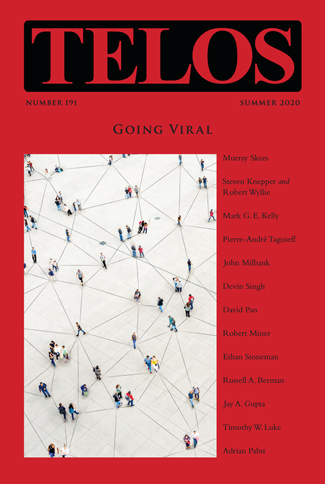In today’s episode of the Telos Press Podcast, Camelia Raghinaru talks with Devin Singh about his article “Exceptional Economy: Sovereign Exchanges in Carl Schmitt and Giorgio Agamben,” from Telos 191 (Summer 2020). An excerpt of the article appears here. If your university has an online subscription to Telos, you can read the full article at the Telos Online website. For non-subscribers, learn how your university can begin a subscription to Telos at our library recommendation page. Purchase a print copy of Telos 191 in our online store.
|
In today’s episode of the Telos Press Podcast, Camelia Raghinaru talks with Telos editor David Pan about his article “Economy and Ecology: Federal Populism and the Devil in the Details of Universal Basic Income,” from Telos 191 (Summer 2020). An excerpt of the article appears here. If your university has an online subscription to Telos, you can read the full article at the Telos Online website. For non-subscribers, learn how your university can begin a subscription to Telos at our library recommendation page. Purchase a print copy of Telos 191 in our online store. Over the last fifty years, the West has witnessed a continuous decline in the quality of the state and its activities, along with a cultural deterioration of the public sphere. All OECD (Organization for Economic Co-operation and Development) countries have also undergone a massive dichotomization of private property ownership: An ever-smaller fraction of the population owns a growing share of all non-public assets. According to some estimates, the richest one percent holds 70 to 80 percent of all global private property, while an increasing number owns nothing and is excluded from decent incomes and the means to live a normal family life. The following essay originally appeared in Valeurs actuelles on April 2, 2020, and is published here in English translation by permission of the author. Translated by Russell A. Berman.
It has already been said but it is worth repeating: the health crisis is ringing (provisionally?) the death knell of globalization and the hegemonic ideology of progress. To be sure, the major epidemics of antiquity and the Middle Ages did not need globalization in order to produce tens of millions of dead, but it is clear that the generalization of transportation, exchanges, and communications in the contemporary world could only aggravate matters. In the “open society,” the virus is very conformist: it acts like everyone else, it circulates—and now we are no longer circulating. In other words, we are breaking with the principle of the free movement of people, goods, and capital that was summed up in the slogan “laissez faire,” i.e., let it go, let it pass. This is not the end of the world, but it is the end of a world. |
||||
|
Telos Press Publishing · PO Box 811 · Candor, NY 13743 · Phone: 212-228-6479 Privacy Policy · Data Protection Copyright © 2024 Telos Press Publishing · All Rights Reserved |
||||

 History is always open, as everyone knows, and this makes it unpredictable. Yet in certain circumstances, it is easier to see the middle and long term than the near term, as the coronavirus pandemic shows well. For the short term, one surely imagines the worst: saturated health systems, hundreds of thousands, even millions of dead, ruptures of supply chains, riots, chaos, and all that might follow. In reality, we are being carried by a wave and no one knows where it will lead or when it will end. But if one looks further, certain matters become evident.
History is always open, as everyone knows, and this makes it unpredictable. Yet in certain circumstances, it is easier to see the middle and long term than the near term, as the coronavirus pandemic shows well. For the short term, one surely imagines the worst: saturated health systems, hundreds of thousands, even millions of dead, ruptures of supply chains, riots, chaos, and all that might follow. In reality, we are being carried by a wave and no one knows where it will lead or when it will end. But if one looks further, certain matters become evident. 






